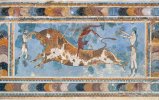dfg42
Senator
Yes there is probably more which happened as what we will discover by historical studies. I think the missing female warriors is due to our own cultural bias, which is mirrored by the romans but not by the Celts (Boudicca!) or the germans. In modern times we had the funny thing, that the Russians had female soldiers the germans not (1941-1945), also in air battles and remarkably among sharp shooters. The best sharp shooter in WW2 is probably a female, Lyudmila Pavlichenko, there are now females of the Medes (you say Kurds) fighting today in syria.Your reasoning is not really convincing to me. Laying a battle ax in the grave of a girl or young woman even though she was not a fighter, just to show her social status, is the least convincing - jewelry and other valuable items would be much more obvious.
To push the Amazons completely into the mythical, early Greek world is only one possible explanation. Almost always there are real models, after all, Amazons are never portrayed together with centaurs or other purely mythical beings ... The encounter with Scythian women warriors on horses seems to me to be an obvious model. And if a grave from around 600 BC was found, the origins of a corresponding cult can be much earlier.
This does not rule out that depictions of the Amazons had a predominantly erotic-pornographic character much later, for example in Roman times...







 .. mmmm...
.. mmmm...



